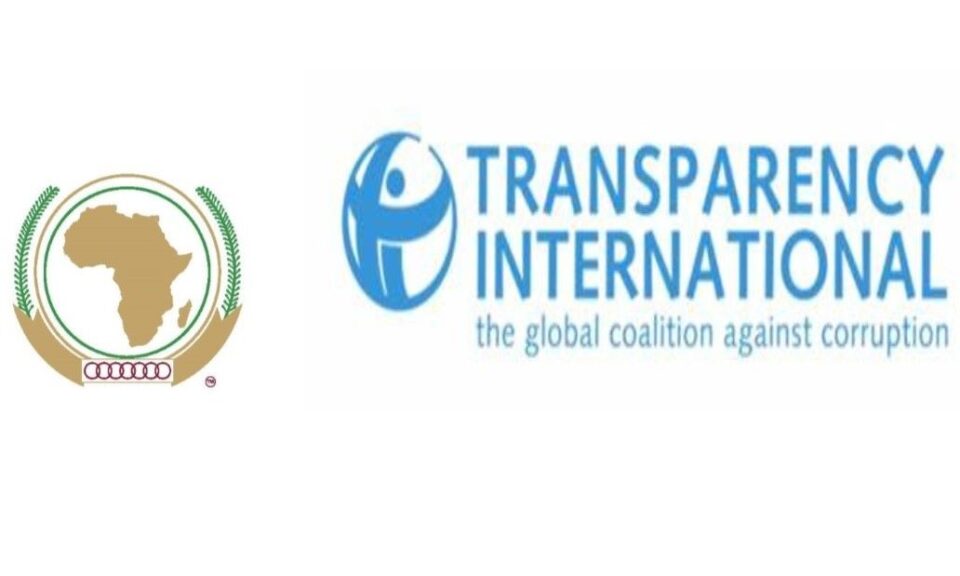TO THE AFRICAN UNION ON THE OCCASION OF THE TWENTIETH ANNIVERSARY OF THE ADOPTION OF THE AFRICAN UNION CONVENTION ON PREVENTING AND COMBATTING CORRUPTION
Transparency International’s open letter
11 July 2023
To African Union Leaders,
On the occasion of the seventh African Anti-Corruption Day and the twentieth anniversary of the adoption of the African Union Convention on Preventing and Combatting Corruption (AUCPCC), Transparency International – through its 28 National Chapters across all of Africa’s Regional Economic Communities – use this opportunity to:
- Congratulate the African Union (AU) on this milestone anniversary of the Convention – a treaty that provides a bold and robust roadmap for the implementation of anti- corruption efforts and reinforces the commitments made by Member States of the AU to uphold democracy, human rights and the rule of law, as well as the underlying values of transparency, integrity, participation and accountability.
- Welcome the theme of this year’s African Anti-Corruption Day, AUCPCC, 20 Years After: Achievements and Prospects, which invites a critical reflection on achievements, challenges and lessons over the past twenty years, and provides an opportunity to cast a vision for the next twenty years and devise strategies for its realisation.
- Commend the 48 Member States of the AU that have ratified the AUCPCC to date and call upon the remaining 7 Member States to take measures to ratify, domesticate, implement and develop clear action plans for this important Convention at the earliest.
- Further commend the 38 Member States of the AU that have ratified the African Charter on Democracy, Elections and Governance, and urge the remaining 17 Member States to take swift measures to do the same.
- Appreciate the efforts of the 17 State Parties to the AUCPCC that have submitted progress reports of their implementation of the AUCPCC thus far and urge the remaining 31 State Parties, on this twentieth anniversary, to take swift action to report their progress on the implementation of the Convention, as required by Article 22(7), along with the full participation of civil society, as required by Article 12.
- Recognising the centrality of the AUCPCC in providing a roadmap for states to implement anti-corruption policies and systems domestically, we urge State Parties to the Convention to accelerate efforts in implementing its provisions, especially in the important areas that have seen particularly slow progress, like the protection of the right to freedom of information (Article 9), the protection of whistleblowers, and transparency and oversight for political financing (Article 10).
- Note with great concern that corruption is and remains a significant threat to democracy and democratic institutions and poses a significant threat to African States in realising Agenda 2063 and the Sustainable Development.
- Commend the AU for establishing a Common Africa Position on Asset Recovery (CAPAR) to facilitate the identification of African assets, including financial resources lost through illicit capital flight and illicit flows, and their return to Africa to finance the continent’s development agenda. We further commend the establishment of the Sub- Committee on Tax and Illicit Financial Flows and the AU’s call for reforms to the global financial In this regard, we urge the AU to accelerate the roll-out and implementation of the Tax and Illicit Financial Flows Strategy to effectively position the continent to drive global reforms on an inclusive tax treaty and increase the resources for Africa’s development agenda.
- Further commend the laudable efforts of the African Union Advisory Board against Corruption (AUABC) in establishing the African Anti-Corruption Research Network (AACRN), leading to the formal adoption of this network by the African delegates on May 2023 and the election of an Interim Caretaker Executive Committee to strategize the next course of the network. Call on African States to speed up the operationalisation of this network, by endowing it with adequate human, financial and technical resources to develop and support the implementation of an actionable anti- corruption research agenda in Africa.
- Remind African leaders of our 2016 call to disclose beneficial ownership information and take other related regulatory measures to end the secrecy that enables corruption.
- Request the AU, in line with Article 18, to support the establishment of a regional exchange of information (EOI) framework, for purposes of tracking cross-border corruption for investigation and prosecution.
- Urge African states to address corruption in the delivery of basic services, with particular focus on housing, water, sanitation, education, health and humanitarian responses as well as public security and judicial services. Corruption in public service delivery disproportionately affects the poorest citizens and particularly disadvantages persons living with disabilities, women and children who depend on these services. In this regard, further note that corruption in land management systems exacerbates inequalities by violating the fundamental rights of local communities, particularlygroups that experience marginalisation. We urgently remind African leaders of our 2018 call to:

